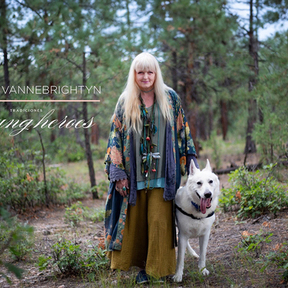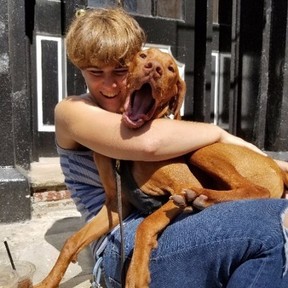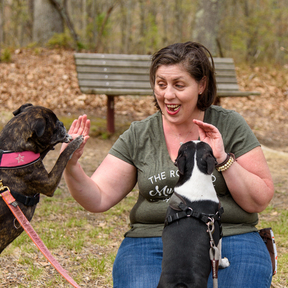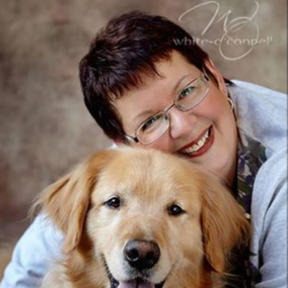-
Delinda VanneBrightyn
- ZenDogology - Private Dog Training Nationally - Nationwide
-
 INSTANT
CHECKOUT
INSTANT
CHECKOUT
 RAPID
RESPONDER
RAPID
RESPONDER
- Taos, NM - Is your furry friend feeling anxious, overly aggressive, or just plain out of control? With over 24 years of specialized professional experience in training search and rescue...
-
(3 reviews)
-
- Insured
- Online Sessions
- Book Now
-
Nikki Finn-Loudenslager
- One of Arizona’s Leading Dog Behavior Consultants - Nationwide
-
 PREMIUM
PRO
PREMIUM
PRO
 INSTANT
CHECKOUT
INSTANT
CHECKOUT
 RAPID
RESPONDER
RAPID
RESPONDER
 CERTIFIED
CPDT-KA
CERTIFIED
CPDT-KA
- Show Low, AZ - I’m Nikki Finn-Loudenslager, Certified Dog Behavior Consultant (CDBC), IAABC Credentialing Director, and author of How to Find Your Compatible Canine. With over 15 years of experience...
-
(1 review)
-
- Licensed
- Certified
- Bonded
- Insured
- Online Sessions
- Book Now
- Rachel LaMere
- The Positive Pup - Certified Dog Training Service - Nationwide
-
 CERTIFIED
CPDT-KA
CERTIFIED
CPDT-KA
- Chicago, IL - As an Animal Behavior College Certified Dog Trainer (ABCDT) and a Certified Professional Dog Trainer (CPDT-KA), I specialize in positive reinforcement techniques to enhance the bond between...
-
-
- Certified
- Online Sessions
- Request Quote
-
Kelly Citrin
- 4 On The Floor Dog Training and Behavior Consulting - Nationwide
-
 INSTANT
CHECKOUT
INSTANT
CHECKOUT
 CERTIFIED
CPDT-KA
CERTIFIED
CPDT-KA
- Rockville, MD - 4 On the Floor was founded by Kelly Citrin, CPDT-KA, MBA with the training philosophy of patience, persistence & positive reinforcement, including praise & play. We offer...
-
-
- Licensed
- Certified
- Online Sessions
- Book Now
-
Audra Anderson
- A Well-Trained Dog In Home Dog Training Services - Nationwide
-
 INSTANT
CHECKOUT
INSTANT
CHECKOUT
- Clinton, WI - Hello, my name is Audra Anderson. I have been a certified dog trainer since 2007. From a young age, I have been passionate about dogs and their...
-
-
- Certified
- Insured
- Online Sessions
- Book Now
-
Nicolas Bardon-desegonzac
- NADOI Certified Trainer and Dog Behaviorist - Nationwide
-
 INSTANT
CHECKOUT
INSTANT
CHECKOUT
 RAPID
RESPONDER
RAPID
RESPONDER
- Wayne, PA - Pine Street Assistance Dogs specializes in the training of puppies and dogs of all ages in the Philadelphia area. We also retrain highly trained dogs in new...
-
-
- Certified
- Online Sessions
- Book Now
-
Chelsea Kronick
- Sundog Pet Care - Mobile Dog Training - Nationwide
-
 INSTANT
CHECKOUT
INSTANT
CHECKOUT
 CERTIFIED
CPDT-KA
CERTIFIED
CPDT-KA
- Brooklyn, NY - At Sundog, we've been passionately serving pets since December 2021, providing expert pet training and behavior modification services with a focus on creating richer, more rewarding relationships...
-
(2 reviews)
-
- Certified
- Insured
- Online Sessions
- Book Now
-
Allison Raymunt
- Allison's Animal Academy - Dog Training and Animal Reiki - Nationwide
-
 INSTANT
CHECKOUT
INSTANT
CHECKOUT
 CERTIFIED
CPDT-KA
CERTIFIED
CPDT-KA
- Litchfield, CT - As a Certified Professional Dog Trainer (CPDT-KA) and Certified Animal Reiki Practitioner, my passion lies in enhancing the bond between humans and their furry companions through customized,...
-
(3 reviews)
-
- Licensed
- Certified
- Bonded
- Insured
- Online Sessions
- Book Now
-
Karen Lanoue-Lambrecht
- Pawsitively Obedient - Dog Training Services - Nationwide
-
 INSTANT
CHECKOUT
INSTANT
CHECKOUT
- Marshfield, MA - CELEBRATING 30 years of instructing people and their pets using positive reward-based training methods. Our Certified Instructors are required to have 36 Continuing Education hours every 3...
-
-
- Certified
- Insured
- Online Sessions
- Book Now
-
Karen George
- Always On Cue Dog Training - Nationwide
-
 INSTANT
CHECKOUT
INSTANT
CHECKOUT
- Gainesville, FL - Karen George is a highly experienced nurse with over 23 years of experience. She is also an accomplished dog trainer, with nearly 21 years of experience in...
-
-
- Licensed
- Certified
- Insured
- BBB Accredited
- Online Sessions
- Book Now
- Jackie Earnshaw
- SitSpot Canine Center - CCPDT Certified Dog Trainer - Nationwide
-
 CERTIFIED
CPDT-KA
CERTIFIED
CPDT-KA
- Susanville, CA - As a Certified Professional Dog Trainer (CPDT-KA) with over 35 years of experience, I am passionate about helping pets and their owners build a strong, positive relationship....
-
-
- Certified
- Request Quote
-
Adelita Alvarez
- Behavioral Dog Training - Techniques for Success - Nationwide
-
 PREMIUM
PRO
PREMIUM
PRO
- Burbank, CA - I help people with their puppies and dogs with behavioral dog training. It isn't easy to take on a rescue dog as they basically need someone to...
-
(2 reviews)
-
- Certified
- Online Sessions
- Request Quote
-
Adelita Alvarez
- Veterinary Approved - Classes, Lessons and Social Pack Walks - Nationwide
-
 PREMIUM
PRO
PREMIUM
PRO
 INSTANT
CHECKOUT
INSTANT
CHECKOUT
 RAPID
RESPONDER
RAPID
RESPONDER
- Burbank, CA - Group Obedience Classes - 12 classes that review Basic Obedience for both puppies and adult dogs. Most people return to continue socialization and giving an opportunity for...
-
(2 reviews)
-
- Licensed
- Certified
- Insured
- Online Sessions
- Book Now
-
Christine Epp
- Peaceful ConsultingAnimal Behaviorist - Nationwide
-
 PETWORKS
PICK
PETWORKS
PICK
 INSTANT
CHECKOUT
INSTANT
CHECKOUT
- , - Struggling with pet routines, multi-pet dynamics, or household stress? I help pet parents build calm, balanced homes through remote behavioral and routine consulting. From new rescues to senior...
-
(5 reviews)
-
- Certified
- Book Now
-
Cherie Mascis
- AllPets Training and Behavior Solutions - Nationwide
-
 PETWORKS
PICK
PETWORKS
PICK
 INSTANT
CHECKOUT
INSTANT
CHECKOUT
 CERTIFIED
CPDT-KA
CERTIFIED
CPDT-KA
- Columbus, NC - I am a Pet Professional Guild Multispecies Training Professional, a Certified Professional Dog Trainer-knowledge assessed (CPDT-KA), an Association of Professional Dog Trainers (APDT) Canine Life and Social...
-
(1 review)
-
- Licensed
- Certified
- Insured
- Online Sessions
- Book Now
-
Tina Lohyn
- Practical Pet Training - Nationwide
-
 RAPID
RESPONDER
RAPID
RESPONDER
 CERTIFIED
CPDT-KA
CERTIFIED
CPDT-KA
- Hellertown, PA - I have been told that I understand dogs and cats and the struggles that pet parents have with their animals. I have the ability to relate to...
-
(1 review)
-
- Certified
- Request Quote
featured cities
- Dog Behaviorist Albuquerque
- Dog Behaviorist Atlanta
- Dog Behaviorist Austin
- Dog Behaviorist Baltimore
- Dog Behaviorist Boston
- Dog Behaviorist Charlotte
- Dog Behaviorist Chicago
- Dog Behaviorist Cleveland
- Dog Behaviorist Colorado Springs
- Dog Behaviorist Columbus
- Dog Behaviorist Dallas
- Dog Behaviorist Denver
- Dog Behaviorist Detroit
- Dog Behaviorist El Paso
- Dog Behaviorist Fort Worth
- Dog Behaviorist Fresno
- Dog Behaviorist Houston
- Dog Behaviorist Indianapolis
- Dog Behaviorist Jacksonville
- Dog Behaviorist Kansas City
- Dog Behaviorist Las Vegas
- Dog Behaviorist Los Angeles
- Dog Behaviorist Louisville
- Dog Behaviorist Memphis
- Dog Behaviorist Mesa
- Dog Behaviorist Miami
- Dog Behaviorist Milwaukee
- Dog Behaviorist Minneapolis
- Dog Behaviorist Nashville
- Dog Behaviorist New Orleans
- Dog Behaviorist New York City
- Dog Behaviorist Oklahoma City
- Dog Behaviorist Omaha
- Dog Behaviorist Philadelphia
- Dog Behaviorist Phoenix
- Dog Behaviorist Portland
- Dog Behaviorist Raleigh
- Dog Behaviorist Sacramento
- Dog Behaviorist San Antonio
- Dog Behaviorist San Diego
- Dog Behaviorist San Francisco
- Dog Behaviorist San Jose
- Dog Behaviorist Seattle
- Dog Behaviorist Tampa
- Dog Behaviorist Tucson
- Dog Behaviorist Tulsa
- Dog Behaviorist Virginia Beach
- Dog Behaviorist Washington DC
related articles
more info
When hiring a certified canine behaviorist for sessions with your dog, consider these three important questions:
What are your qualifications and experience with canine behavior?
Why This Matters: The behaviorist’s qualifications and experience will directly impact their ability to address your dog's specific issues effectively. Certified behaviorists typically have extensive training and practical experience.
What to Ask: Request information about their certification (e.g., International Association of Animal Behavior Consultants (IAABC), Animal Behavior Society (ABS)), years of experience, and their background working with dogs similar to yours. For instance, experience with certain breeds or behavioral issues like aggression or anxiety can be important.
What techniques and methods do you use for behavior modification?
Why This Matters: The methods used can greatly affect the success of behavior modification and your dog’s well-being. It's crucial to ensure that the techniques align with your values and are appropriate for your dog’s temperament.
What to Ask: Ask whether they use positive reinforcement, clicker training, desensitization, counter-conditioning, or other methods. A reputable behaviorist should use humane, evidence-based approaches and avoid aversive or punitive techniques.
What should I expect in terms of progress, timeline, and follow-up?
Why This Matters: Understanding the expected timeline and progress helps manage expectations and ensures that you’re prepared for the commitment involved. It’s also important to know how follow-up and support will be handled.
What to Ask: Inquire about the typical duration of treatment for issues similar to your dog's, the milestones you should expect, and how progress will be assessed. Additionally, ask about follow-up sessions and ongoing support to track progress and make necessary adjustments to the plan.
Becoming a certified canine behaviorist involves extensive education and training. Aspiring behaviorists typically earn a degree in animal behavior, psychology, or a related field. They gain practical experience through internships or working with experienced professionals. Certification often requires completing a specific number of hours in behavior consulting and passing an examination from a recognized organization, such as the International Association of Animal Behavior Consultants (IAABC) or the Animal Behavior Society (ABS).
You may also consider booking these pet care services:
Dog Behaviorist by State




















